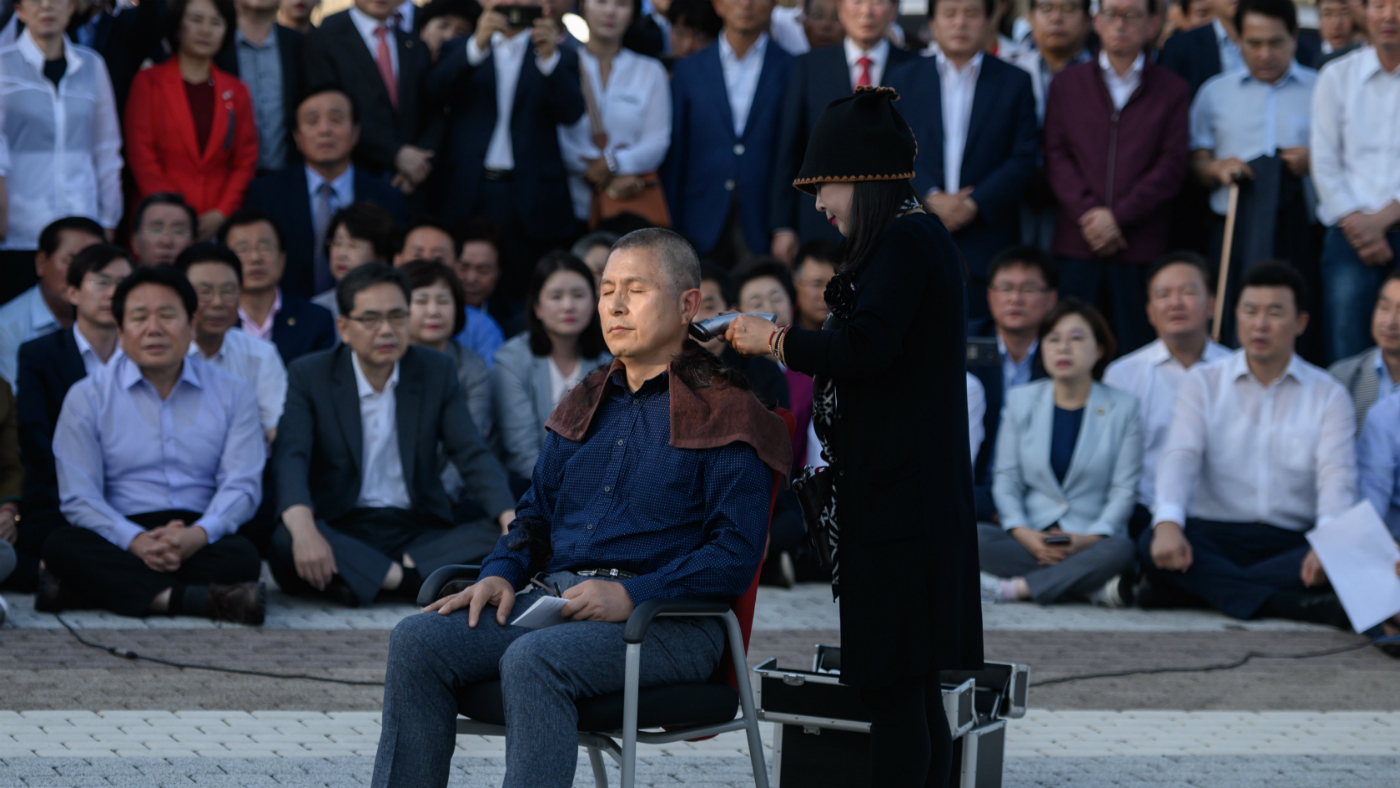Why Korean politicians are shaving their heads
Opposition leaders are furious about controversial government appointment

A free daily email with the biggest news stories of the day – and the best features from TheWeek.com
You are now subscribed
Your newsletter sign-up was successful
Opposition politicians in South Korea’s parliament are shaving their heads in protest against the appointment of a justice minister whose family is being investigated for suspected wrongdoing.
The parliament’s deputy speaker, Lee Ju-young of the right-wing Liberty Party, on Wednesday became the eighth politician to cut off all their hair over the choice of Cho Kuk, who took office as head of the Ministry of Justice last week.
The group protesting against Cho’s appointment by President Moon Jae-in also includes Liberty Party leader Hwang Kyo-ahn, who “sat in front of Seoul’s presidential palace on Monday evening as supporters and journalists looked on while a member of his party removed his hair”, Fox News reports.
The Week
Escape your echo chamber. Get the facts behind the news, plus analysis from multiple perspectives.

Sign up for The Week's Free Newsletters
From our morning news briefing to a weekly Good News Newsletter, get the best of The Week delivered directly to your inbox.
From our morning news briefing to a weekly Good News Newsletter, get the best of The Week delivered directly to your inbox.
Amid growing calls for Cho to step down, deputy speaker Lee told reporters that the new justice chief “cannot be the leader of reform”, adding: “The people’s stern order is for him to resign immediately and be investigated.”
According to The Japan Times, the appointment has also “stained” President Moon’s “reformist image” and “caused a slide in his approval ratings”.
So what exactly is going on in South Korea?
Who is Cho Kuk?
A free daily email with the biggest news stories of the day – and the best features from TheWeek.com
The 54-year-old is a former law professor and previously served as the senior secretary to the president for civil affairs in Moon’s cabinet.
Sky News describes Cho as a “close political ally” of the popular left-wing leader, who took power in the wake of the historic impeachment and imprisonment of his right-wing predecessor Park Geun-hye. Reuters adds that Cho has developed a “reputation as a progressive”.
Moon has previously referred to him as the ideal person to carry out reforms of the Justice Ministry and the prosecution system.
But Cho’s family has been linked to an ongoing investigation by the South Korean prosecutor’s office over a number of fraud allegations.
Financial misconduct investigation
On Saturday, state prosecutors requested a warrant to formally arrest Cho Beom-dong, a cousin of the new justice minister, on suspicion of rigging stock prices and embezzlement. Cho Beom-dong is also suspected of running a firm, Co-Link Private Equity, without registering as the chief executive, as well as “trying to pressure witnesses into making false statements” at his cousin’s parliamentary confirmation hearings, Sky News adds.
Cho Beom-dong is believed to be the de facto owner of Co-Link, which managed private equity fund Blue Core Value-Up. Cho Kuk’s wife Chung Kyung-shim, their two children and other members of the family collectively invested 1.4bn won (£948k) in Blue Core Value-Up.
Chung is also due to be summoned by prosecutors amid allegations she gave her brother money to invest in Blue Core Value-Up and then bought stock worth 500m won (£34k) in Co-Link.
In addition, Cho Beom-dong is reportedly accused of attempting to destroy evidence linked to his connections to Co-Link.
University admission row
Even more troubling for many South Koreans is Cho Kuk’s alleged use of his political influence to get his daughter into a top university in Seoul. The controversy centres on media reports that his daughter was granted a scholarship and other academic perks that allegedly did not reflect her academic performance.
Prosecutors have also indicted Cho’s wife on suspicion of forging an award issued to her daughter from the university where she works as a professor, in the southern city of Yeongju.
Reuters suggests that this element of the scandal surrounding the family has “struck a chord in South Korea”, where young people are forced to “compete fiercely through school and university” and are “increasingly scrambling for positions in a slack job market in a system they see as plagued by unfairness and bias in favour of the elite”.
At his confirmation hearing last Friday, Cho expressed his “deepest apologies to the younger generation” over the alleged perks his daughter received.
Why are opposition politicians shaving their heads?
The BBC reports that South Korea has a “long tradition of hair shaving as a form of protest” - a process originating in traditional Confucian teaching.
The broadcaster says that the act has “historically been seen as a way of demonstrating commitment to a cause” and that during the country’s military dictatorship in the 1960s and 1970s, “dissidents would often shave their heads as a sign of resistance”.
“According to Confucianism, which emphasises filial piety, damaging any part of your body, including the hair, gifted by our parents, is an unforgivable disrespect,” cultural critic Kim Sung-soo told the Korea Herald.
“Hence, shaving the head would imply one’s determination on a matter almost worth risking one’s life.”
All eight members of parliament who have shaved their heads so far are either members of the Liberty Party or independents supportive of the party.
Despite the furore surrounding Cho’s appointment, President Moon has stressed there has been no confirmation of illegal action and said it would be “bad precedent” to dismiss a minister based on unproven allegations.
Nevertheless, Moon could pay the price for his appointment at next year’s election.
As The Japan Times notes, the president also “faces pressure over a decaying job market, a history and trade row with Japan and a fragile diplomacy with nuclear-armed North Korea that is beginning to show signs of falling apart”.
And in a nation where the previous leadership was brought down by a corruption row, some commentators believe Moon may come to regret supporting Cho.
-
 Who is Starmer without McSweeney?
Who is Starmer without McSweeney?Today’s Big Question Now he has lost his ‘punch bag’ for Labour’s recent failings, the prime minister is in ‘full-blown survival mode’
-
 Hotel Sacher Wien: Vienna’s grandest hotel is fit for royalty
Hotel Sacher Wien: Vienna’s grandest hotel is fit for royaltyThe Week Recommends The five-star birthplace of the famous Sachertorte chocolate cake is celebrating its 150th anniversary
-
 Where to begin with Portuguese wines
Where to begin with Portuguese winesThe Week Recommends Indulge in some delicious blends to celebrate the end of Dry January
-
 Epstein files topple law CEO, roil UK government
Epstein files topple law CEO, roil UK governmentSpeed Read Peter Mandelson, Britain’s former ambassador to the US, is caught up in the scandal
-
 Iran and US prepare to meet after skirmishes
Iran and US prepare to meet after skirmishesSpeed Read The incident comes amid heightened tensions in the Middle East
-
 Israel retrieves final hostage’s body from Gaza
Israel retrieves final hostage’s body from GazaSpeed Read The 24-year-old police officer was killed during the initial Hamas attack
-
 China’s Xi targets top general in growing purge
China’s Xi targets top general in growing purgeSpeed Read Zhang Youxia is being investigated over ‘grave violations’ of the law
-
 Panama and Canada are negotiating over a crucial copper mine
Panama and Canada are negotiating over a crucial copper mineIn the Spotlight Panama is set to make a final decision on the mine this summer
-
 Why Greenland’s natural resources are nearly impossible to mine
Why Greenland’s natural resources are nearly impossible to mineThe Explainer The country’s natural landscape makes the task extremely difficult
-
 Iran cuts internet as protests escalate
Iran cuts internet as protests escalateSpeed Reada Government buildings across the country have been set on fire
-
 US nabs ‘shadow’ tanker claimed by Russia
US nabs ‘shadow’ tanker claimed by RussiaSpeed Read The ship was one of two vessels seized by the US military